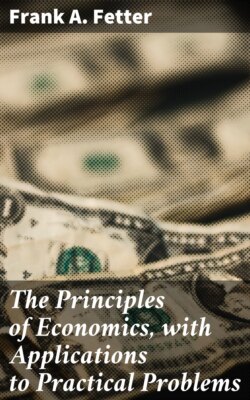Читать книгу The Principles of Economics, with Applications to Practical Problems - Frank A. Fetter - Страница 17
На сайте Литреса книга снята с продажи.
§ II. DESIRES FOR NON-MATERIAL ENDS, AS SECONDARY ECONOMIC MOTIVES
ОглавлениеThe real man in economics
1. The spiritual nature of man must not be ignored in economic reasoning. There has been much and just criticism of the earlier writers and of their conclusions because so little account was taken by them of any but the motive of self-interest in economic affairs. Generally it was assumed that men knew their own interest, and sought in a very unsympathetic way those things which would gratify their material wants. Thus man in economic reasoning was made an abstraction, differing from real men in his lack of manifold spiritual and social elements.
Desires for the non-material may become economic motives
2. The main classes of non-material wants that are secondarily economic are fear of temporal punishment; sentiments of moral and religious duty; pride, honor, and fear of disgrace; and pleasure in work for itself, for social approval, or for a social result. The first is best illustrated by slavery, where the slave is not impelled to seek wealth for his own welfare, but is driven by punishment to perform the task. The object is to create within the mind of the slave a motive that will take the place of the ordinary economic motive. The feeling of religious or moral duty leads men to act often in direct opposition to the usual economic motive. The taboo is faithfully observed by the members of a savage tribe who suffer as a result the severest hardships. A religious injunction prevents the use of food that would save from starvation. Pride, either of family or of calling; the soldier's honor leading him to sacrifice not only his future but his life; the love of social approval, holding men to the most disagreeable tasks—these illustrate how strongly social sentiments oppose the narrower motive of immediate self-interest as generally thought of. Pleasure in work for work's sake, and pride in the result, may act as motives quite as strong in some cases as desire for the product that can be used. And even where this does not change the kind of work done, it comes in to influence the interest and earnestness with which the work is performed.
Economists must overlook no influence on value
3. Whatever motive in man's complex nature makes him desire things more or less, becomes for the time, and in so far, an economic motive. These various social and spiritual motives sometimes work positively, in the direction of magnifying man's desire for things; sometimes negatively, to diminish it. If we are to understand economic action, we must take men as they are. A religious motive that leads men to refrain from the eating of meat or to eat fish in preference on certain days, is a fact which the economist has but to accept, for it is sure to affect the value of meat and fish at that place and time. Moral convictions, whatever be their origin, whether due to the teaching of parents, to unconscious influences, or to native temperament, may be quite as effective as the pangs of hunger in determining what men desire. Therefore, while these various motives are primarily social or moral or religious, they may be said to be secondarily economic motives, and they may become in certain cases the most important influences of which the economist must take account.
